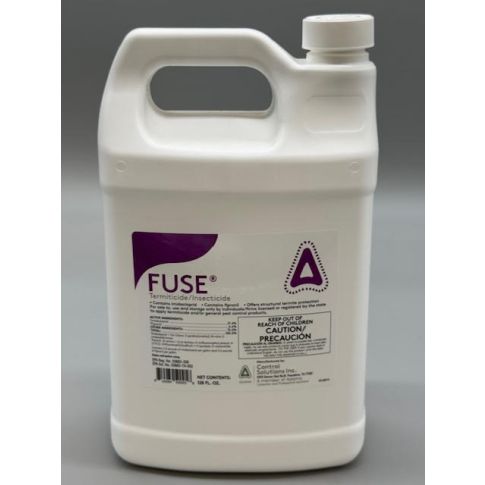Be the first to review this product
FUSE GALLON
Fuse Termiticide/Insecticide contains both imidacloprid and fipronil as its active ingredients. Both ingredients work by affecting the insects' nervous systems, creating a highly effective method of pest control. It is labeled for termite and perimeter pest control applications. In addition to termites, Fuse will control many other insect pests including ants, earwigs, millipedes, boxelder bugs, silverfish, and pillbugs. Please consult the label for a complete list.
Fuse is non-repellant, which means that the insects cannot detect it and will readily come into contact with it. In doing so, they will receive a lethal dose of the insecticide. With insects such as termites and ants, they will also carry this lethal dose back to the colony and spread it among the other insects as well.
| Size | GALLON |
| Manufacturer | CONTROL SOLUTIONS [view products, website] |
| EPA# | 53883-328 |
| Active Ingredient | Fipronil, Imidacloprid |
| Label | csi82100001_fuse_label_05072019.pdf |
| SDS | csi82100001_fuse_sds_05072019.pdf |
| Chemical Classes | Pyrazole Nicotinoid |
| Target Pests | Termites, Ants, Earwigs, Millipedes, Box Elder Bugs, Silverfish, Pillbugs |
| Use | Commercial & Residential Outdoor Perimeters: Only around Homes or Commercial Buildings * See label for complete list * Indoor Treatments is Limited to Spot Treatments for Live Termite Infestations * Not For Use Indoors for General Insect Control * Do Not Use Directly On Pets |
| Application | Termite Barrier: 27.5 oz. per 100 gallons of water for 0.067% (55 oz. per 100 gallons for 0.13%) Insect Barrier: 0.3 - 0.6 oz. per gallon of water * See label for complete application instructions |
| No Web orders to | AK, CA, CT, HI, IN, MD, MN, NY, PR, VT, NON U S LOCATIONS |
| Yield | 27.5 oz. bottle will treat 240 linear feet |
FUSE contains imidacloprid and fipronil. Both act in the insects’ nervous systems, but in different locations. Imidacloprid targets post-synaptic nicotinic acetylcholine receptors in insects, causing over-stimulation of the insects’ nervous systems. Fipronil acts as a post-synaptic gamma-aminobutyric acid (GABA) inhibitor, also resulting in over-stimulation of the insects’ nervous systems.
USE INSTRUCTIONS
For subterranean termite control, specific treatment recommendations may differ due to regulations, treatment procedures, soil types, construction practices and other factors. The purpose of chemical soil treatment for termite control is to establish a continuous treated zone (horizontal and/or vertical) between the wood and other cellulose material in the structure and the termite colonies in the soil. The establishment of an aerial or above ground colony may require additional treatments to control the termites, as well as landscape modifications, and/or structural repairs to deny termites of a moisture source. Use a 0.067% to 0.13% dilution based on current recommendations. For a typical control situation, a 0.067% dilution is used. A 0.13% dilution may be used when a severe or persistent infestation exists.
Application Table for Perimeter Treatments
|
Dilution Concentrate |
Narrow Band 1 ft up by 1 ft out |
Wide Band 2 ft up by 2 ft out |
|---|---|---|
| 0.067% | 8 perimeter applications / year | 4 perimeter applications / year |
| 0.13% | 4 perimeter applications / year | 2 perimeter applications / year |
FUSE contains imidacloprid and fipronil. Both act in the insects’ nervous systems, but in different locations. Imidacloprid targets post-synaptic nicotinic acetylcholine receptors in insects, causing over-stimulation of the insects’ nervous systems. Fipronil acts as a post-synaptic gamma-aminobutyric acid (GABA) inhibitor, also resulting in over-stimulation of the insects’ nervous systems.
USE INSTRUCTIONS
For subterranean termite control, specific treatment recommendations may differ due to regulations, treatment procedures, soil types, construction practices and other factors. The purpose of chemical soil treatment for termite control is to establish a continuous treated zone (horizontal and/or vertical) between the wood and other cellulose material in the structure and the termite colonies in the soil. The establishment of an aerial or above ground colony may require additional treatments to control the termites, as well as landscape modifications, and/or structural repairs to deny termites of a moisture source. Use a 0.067% to 0.13% dilution based on current recommendations. For a typical control situation, a 0.067% dilution is used. A 0.13% dilution may be used when a severe or persistent infestation exists.
Application Table for Perimeter Treatments
|
Dilution Concentrate |
Narrow Band 1 ft up by 1 ft out |
Wide Band 2 ft up by 2 ft out |
|---|---|---|
| 0.067% | 8 perimeter applications / year | 4 perimeter applications / year |
| 0.13% | 4 perimeter applications / year | 2 perimeter applications / year |

